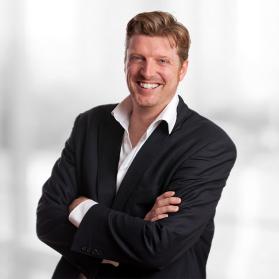Wie ist der Status Quo der digitalen Transformation in der Finanzbranche – gerade auch im Zusammenspiel mit FinTechs? Philip Laucks, Personalchef der Privat- und Firmenkundendivision der Deutsche Bank AG und früherer Chief Digital Officer der Postbank AG, über den Veränderungsdruck der Finanzindustrie, die Entstehung von Neuem in enger Zusammenarbeit mit dem Kerngeschäft und die Rolle von HR.
Detecon: What do digitalization, disruption, and exponential growth models mean for Postbank and the sector as a whole? What opportunities and risks do you see in this regard?
Philip Laucks: The financial sector has been under enormous pressure to make changes for years. This is naturally in part because their business models put them squarely in the sights of startups – so-called fintechs – who want to change completely the market with their disruptive business models. The fintech market in Germany is one of the most highly capitalized markets with the consequence that disruptive companies here find themselves in a really outstanding position. At the same time, however, I must backtrack on this statement a little because the revolution that was once feared has failed to materialize. Both sides have in the meantime moved toward each other and understand that it is best for all if they work together in a common ecosystem. Neither the one nor the other can change the world all by itself.
In terms of our business model, we are affected by disruption less in our core products than in the platform activities. We see relevant market growth for platform operators such as Check24 or Smava, but not necessarily for a new bank player such as N26.
From the customer perspective, we note that, just as in the past, the brand name and the basic trust in this name still play an important role. For instance, if a customer who is approaching retirement has saved €50,000 and wants to make her golden years more pleasant, she is more likely to turn to an established bank than to a fintech. And that is true of all of the major, watershed events in our lives. When it comes to the opening of yet another bank account or an application for an installment loan, customers are indeed drawn to online offers and take advantage of alternative services. So the decisions in this respect are highly dependent on the particular product.
Then that means for you as well that you must find a balance between core business and new activities – lumped together today under the term “ambidexterity.” How exactly have you resolved this at Postbank?
There were intense discussions within the company back in the day. Together with norisbank, for example, we had created a nucleus that was able to develop on its own and operate largely outside the corporate group structures. The spillover effect, however, to the Postbank Group was nil; nothing that happened there found its way back to the core organization. This led to our decision some time ago not to drive digital transformation forward too far outside of the core brand; instead, we created internally small cells of employees who are convinced of the value of the topic and who bring with them the required skills. With the support of these small revolutionary cells, which are distributed throughout the entire company, we can carry the entire corporation. Looking ahead, we will nevertheless place a new digital service oriented to the ambidextrous model on the market. We are less concerned with transformation per se here, but much more on whether we can again occupy parts of the market that are currently difficult for us to reach.
This aligns exactly with our Company ReBuilding approach that revolves around extracting skills from the current organization so that new business can be developed without having to radically turn the entire company on its head. How do you make sure that the new elements later generate the desired network effects and do not disappear again into the void?
A fundamental conviction at Postbank from the very beginning was that simply founding a digital lab would not help us. If you take a closer look at many of these initiatives, it quickly becomes apparent that the ideas developed there run into a dead end when it comes to feeding them back into the core organization. Instead, we created small teams that worked on subjects for a defined period and then brought them back into the organization. One team, for instance, focused on the digitalization of processes for the conclusion of a Postbank installment loan – in collaboration with the colleagues who even today work in this section in the current organization and who are now the digital experts for this topic.
How do you prevent the corporation’s immune system from becoming active and stamping out the new developments, leaving people completely frustrated?
This is a risk, of course, and whether this happens is closely related to existing conditions. When we set up the Chief Digital Office at a separate location in Bonn, colleagues were initially mystified. In the meantime, I would say we have allayed many of their concerns because we have complete transparency about the allocation of budgets, for instance. It is obvious that no one receives special treatment. That is the first step. The second step is to raise the topic to the management agenda level, involving everyone and enjoying the wholehearted commitment of all executive officers – not just that of a CDO.
Does anyone need a CDO at all?
I don’t think it is enough to have just one person driving digital transformation. That is inadequate. Postbank took the approach that the Chief Digital Office would exist for only a limited time. On the other hand, you do need a CDO who can look outside the box and think about topics in broader terms – above all, in a digital context. The standing organization is often unable to do this on its own. A CDO is of course superb at ingraining the digital mindset in the organization. But I will agree with you that a CDO is a transition position and that there will not be many left in 2020.
I would like to talk about the subject of talented people. Competition for applicants is heated – especially in the technological sector. For instance, all companies are looking for data scientists. How do you approach the subject of people with digital talents? And how do you create an attractive environment where people want to stay?
Just as for many other companies, this is a very difficult undertaking, if for no other reason, because of the demographics on the one hand and the extremely good economic situation in Germany on the other. For all practical purposes, the applicant market is swept clean or, to put it another way: We have an employee market today, not an employer market. In a normal competitive situation, you have a number of ways you can convince a candidate of the value of working for you. The simplest, but not the best, is of course by means of the salary. Another could be to rely solely on the charisma of the brand if you are a company with a great brand name. The third approach relates to responsibility: How much impact can I as an employee make? I believe you have to determine which of these is the best approach on a person-to-person basis. We achieved positive results at Postbank by securing people’s loyalty at a very early stage, e.g. from work-study or vocational training programs. Postbank has one of the largest vocational training programs of any company in Germany. We generate loyalty less through the amount of the salaries, but more through interesting projects, through vocational and advanced training – for instance, at Postbank Systems AG, where we naturally have a lot of technical profiles. We have succeeded in increasing substantially the number of people working at Postbank Systems AG, but nevertheless we are not able to recruit all the employees we want to have.
In your opinion, how must managers also change?
We should probably view this issue from two different perspectives. One is that we are a strictly regulated bank and are consequently unable to operate as freely as companies in other sectors. We are forced to comply with certain regulatory processes and require maximum discipline in carrying them out – this is why we have a hierarchical organization in most divisions. We still need employees for certain regulated processes and procedures who are prepared to work in this type of environment. The tricky part here is to create on the other side breathing room for the employees who want to work agilely and to develop new topics. Our management team has also changed significantly. Today, we sit in open-plan offices and have lowered barriers. This has led to a change in culture as well – for instance, we use the informal form of address with many of our employees, no longer wear ties all the time, and are more casual in our interaction with one another. We have given up many of our status symbols, and our interaction has become much more direct. But our focus is on professional skills and not the hierarchy.
In what direction do you see the role of HR developing? In the future, it is possible that many of the tasks of this department will be handled by artificial intelligence. How are you on the HR side prepared to handle this, and where is the journey heading?
Postbank still has a structure that is very traditional; this is in contrast to Deutsche Bank, to mention one example, that is currently introducing a completely new HR system. Once this tool has become established, we will of course also examine the results and above all take a look at what opportunities for people analytics it generates. We are on the right path, but we are far from reaching our destination.
How do you deal with the situation that you always have employees in the company who support transformation enthusiastically and others that do everything they can to prevent any change? Do you try to convince them of the benefits of your cause and to carry them along with you?
It is simply a fundamental truth: If you move only at the speed of the slowest person, you will never really make any significant progress. Conversely, a method of orienting your actions solely to the fastest person and leaving the rest behind is equally nonproductive. So it is important to have as many employees as possible on the band wagon and to support them along the journey. Ultimately, you as the entrepreneur will win only if all employees (as far as that is possible) cross the finish line. And that is precisely the attitude that management must have.
If you now look five years ahead into the future, when would you say you have been genuinely successful in your role?
From the company perspective, I would have a good feeling if a major part of our new business and our mass business were running via digital channels and if, in five years, we had a fundamental understanding of acting and thinking digitally and approached problems differently than the way we do in today’s static world. Moreover, I would have a good feeling if in five years young university graduates were to say: “Hey, I would like to work at Postbank or at Deutsche Bank. That looks like a really cool company to me!” That is more or less how I would define that.
Thank you very much for this interview!
The Interview was conducted by Marc Wagner and Vanessa Dahm
Philip Laucks has been a member of the Executive Committee Private and Commercial Banking at Deutsche Bank and on the Supervisory Board of DB Privat- & Firmenkundenbank AG since May 2018. After completing training as a banker and earning a degree at the University of Regensburg, he held a number of different management positions within the Deutsche Bank Group, including that of CEO of the norisbank GmbH, chief digital officer of Deutsche Postbank AG, and chief HR officer of Deutsche Postbank AG.






